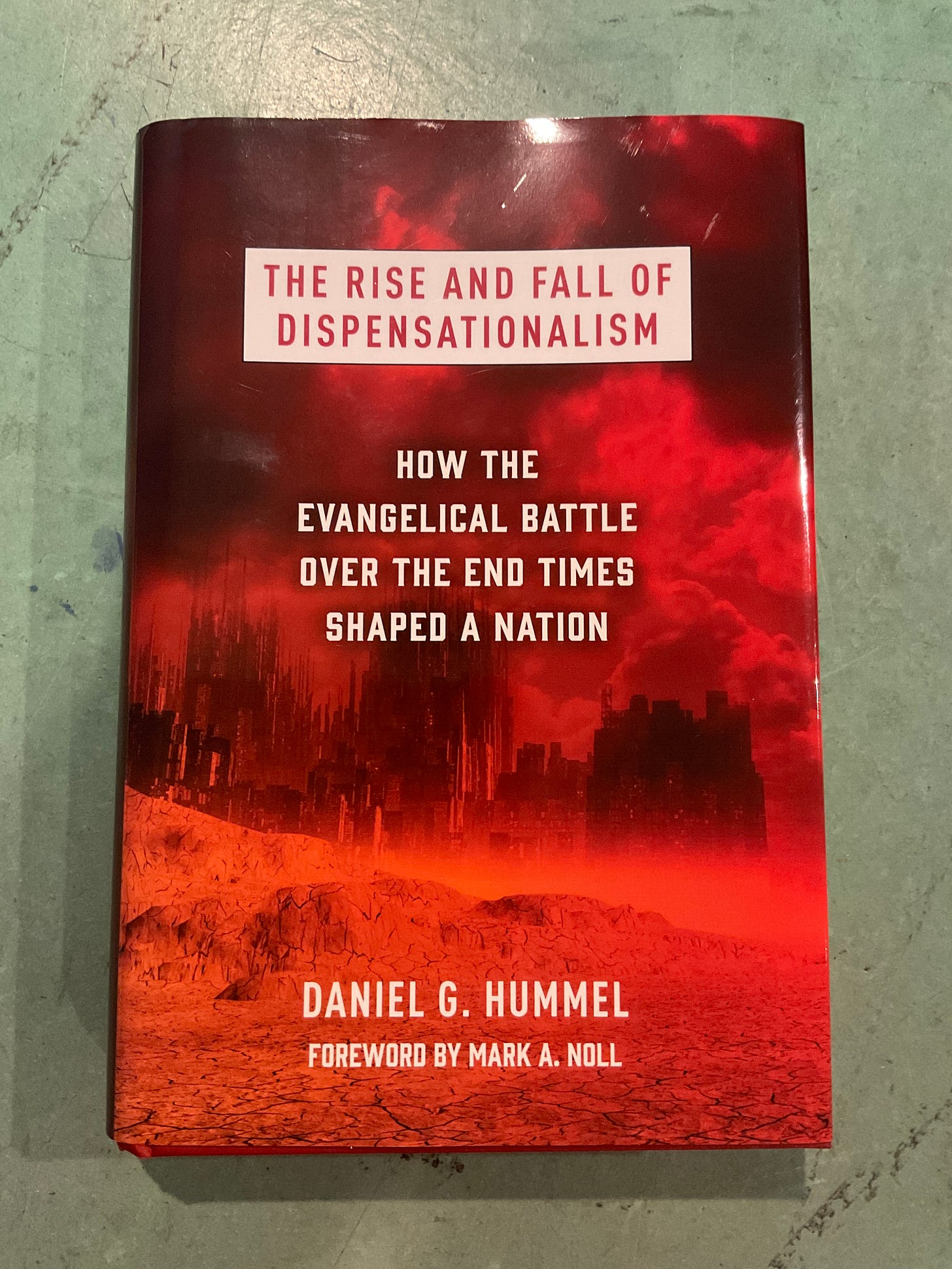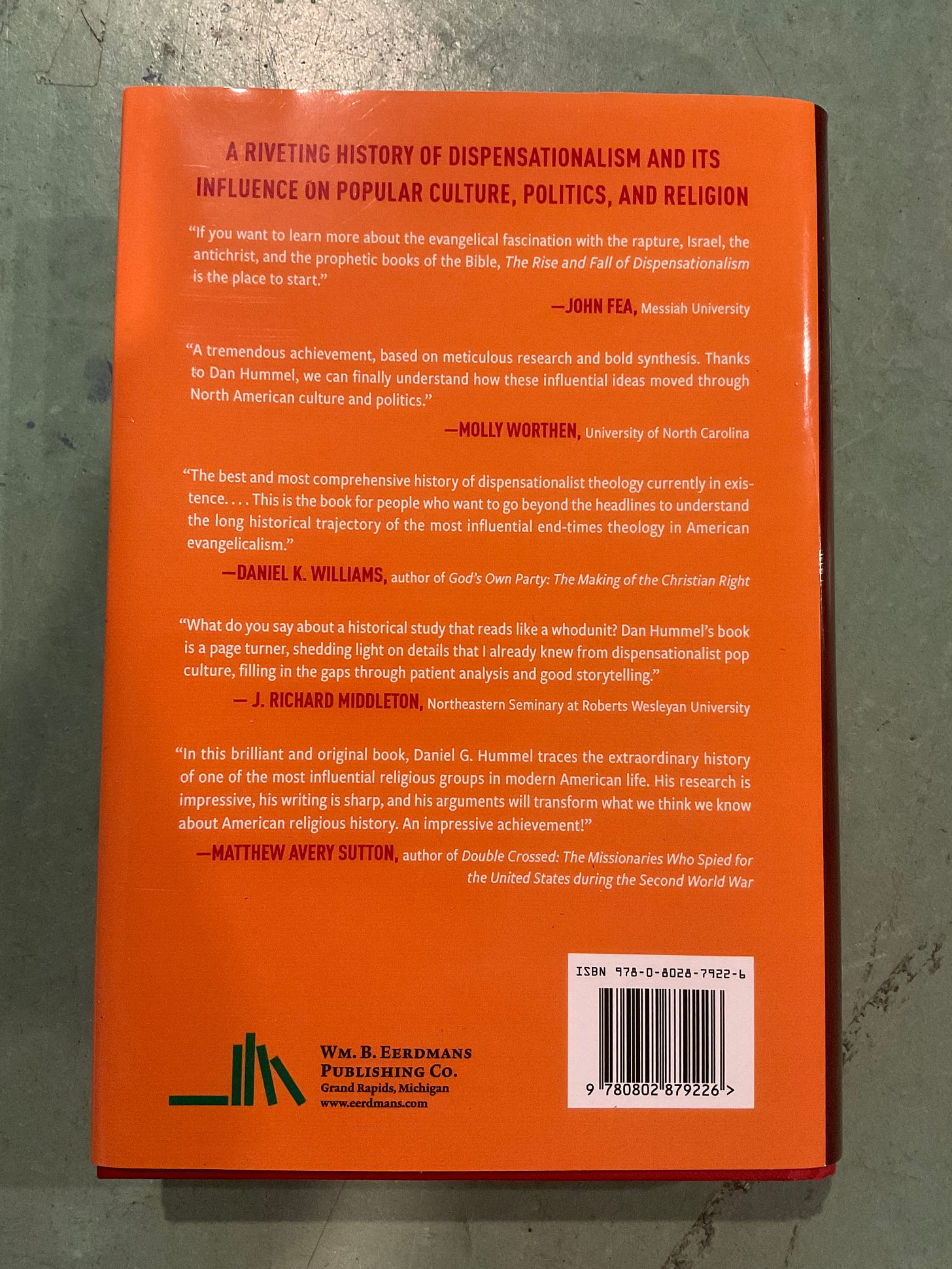Book Review: “The Rise and Fall of Dispensationalism - How the Evangelical Battle Over the End Times Shaped a Nation” by Daniel G. Hummel
If we went for a coffee today, more than likely, I’d bring up this book.
How did I get it?
Well, there I was… (that’s how my friend, Brad Hoffman used to begin every story), anyway, there I was, minding my own business, listening to the next episode of “Thinking in Public” with Dr. Albert Mohler. It was an interview with this author about this book.
Since, I had just read “Ever Reforming” by Dr. Andy Wood, my ears perked up, especially with the words “fall of Dispensationalism.” I listened to the whole conversation. They may have said it and I missed it, but I didn’t know why Dispensationalism had “fallen.” I wanted to read the book.
So, since I still have a balance on the gift card to Barnes & Noble I received from the good people at Azalea Baptist earlier this year, I pulled the trigger and it came in the mail a couple of days later.
What is the book about?
Mr. Hummel is a historian. He starts by defining Dispensationalism as a way of understanding the Scriptures with these three distinct perspectives. First, with premillennialism as the basis for eschatology. (That means that we are living before the millennial, one thousand year, reign of Christ, as opposed to the post-millennial, which is we are living after the reign of Christ, or a-millennial which means that the thousand year reign of Christ is metaphorical.) Second, that there is a distinction between Israel and the church. The church hasn’t replaced Israel. God has a plan and some promises still to be delivered to the descendants of Israel. Lastly, it’s a literal, historical-grammatical hermeneutic. That means that we read the Scriptures plainly, understanding its meaning primarily without metaphor, analogy and so forth.
Then, he tells the story of its rise starting with John Nelson Darby, the Irish born Brethren minister in the early 1800’s. Hummel says that it was because of the religious environment Hummel was in that he realized the validity of these three things, premillennialism, Israel/church distinction and the literal hermeneutic. He tracks Darby and his prolific writing and his tours through the United States, making the connections to other people who would give rise to Dispensationalism.
He carefully tracks the writers and preachers and thinkers and people that created institutions all through the 1800’s and 1900’s. Many names I recognized like Scofield, Chafer, Walvoord, Moody, Lindsey, LaHaye and so forth. It culminated in Dallas Theological Seminary. There were other institutions of course.
Near the very end of the book was the fall of Dispensationalism. He defines the fall as being scholastic. It was in the 1900’s that the faculty of Dallas Seminary definitively departed from classic Dispensationalism into progressive Dispensationalism which appeared identical to historic premillennialism. Dispensationalism was dead at Dallas. It is still being taught at smaller institutions, but doesn’t really have standing in any of the journals or conferences.
Of course, Dispensationalism is still vibrant among Christians all over the world. It’s still being taught by pastors and missionaries across the globe. Mr. Hummel believes that this will be short-lived, as in the academy it’s lost its prominence.
What did I think?
Mr. Hummel in the opening paragraphs writes how he grew up in a home that was steeped in Dispensationalism. His parents had a treasured copy of Schofield’s Bible, Chafer’s books and so forth. As the book progresses, it’s not difficult to detect his disdain as he tells the story. At some points, it feels like he’s recording the spread of a virus through contact-tracing.
When he gets to the ‘90’s and 00’s, and the resurgence of Calvinism, termed New Calvinism, it was apparent to me that he had nothing negative to say. My hunch, and I could be wrong, is that he’s embraced some form of Calvinism and ditched the Dispensationalism of his childhood. I’m interested to hear that story!
It appears that one of his heroes is a man named Philip Mauro. Mauro was ardent and outspoken Dispensationalist in the early 1900’s. He went through some very difficult personal tragedies and emerged against Dispensationalism. His critiques and writing and speaking from then on continually challenged its system. Mr. Hummel considers his critiques unanswered.
I have mixed feelings about this book. I’m grateful for the history. I’m grateful for the meticulous way he gathered the facts and made the connections and told the story. I really benefitted from learning more about the people, their stories, the significant events and the background on the institutions and churches that have been so influential.
At the same time, I felt like it was not an impartial or unbiased recounting of history. That was disappointing. As I read, I found myself getting frustrated at how some of the people were characterized. The things they stood for and built their ministries on were rendered in a distasteful. It felt like it was assumed that everyone knew that. On the contrary, I would read it and say… “I agree with this statement.”
I don’t recall at any point reading how from the Scriptures, Dispensationalism is wrong. Mauro’s critiques were unanswered, but I don’t know what they are.
What I do know, is that depending on what side of Romans 9 you fall on, will affect what you do with Israel, your hermeneutic, and what you’ll believe about the end times. Romans 9 is the determining factor. And, that is a very vibrant discussion these days. Maybe more than ever. There are very credible, intelligent and I would say conclusive arguments for Dispensationalism to be made from a proper reading of Romans 9-11. Dr. Leighton Flowers and Soteriology 101 would be at the top of that list.
The last thing reading this made me consider is some of my friends that have left Dispensationalism to embrace New Calvinism and a-millennialism or post-millennialism. It made me want to reach out to them and hear the story. Why did they reject it? From what I remember, there was always a sentiment of disgust for it. I don’t have a clear understanding of why and what started the journey and what brought them over the line. If you’re like that, I would like to hear that story.
Conclusion:
This is an interesting book because it tells the history of evangelicalism in the United States through the lens of dispensationalist thought. However, it felt like an inverted hagiography with New Calvinism celebrating the demise of Dispensationalism. The problem is, it’s not dead yet. In fact, it’s New Calvinism that doesn’t actually have a leg to stand on.
soon!
andy
*** Like Dr. Albert Mohler, I love hearing from readers like you. What do you think? Do you have any suggestions for books for me to review?





